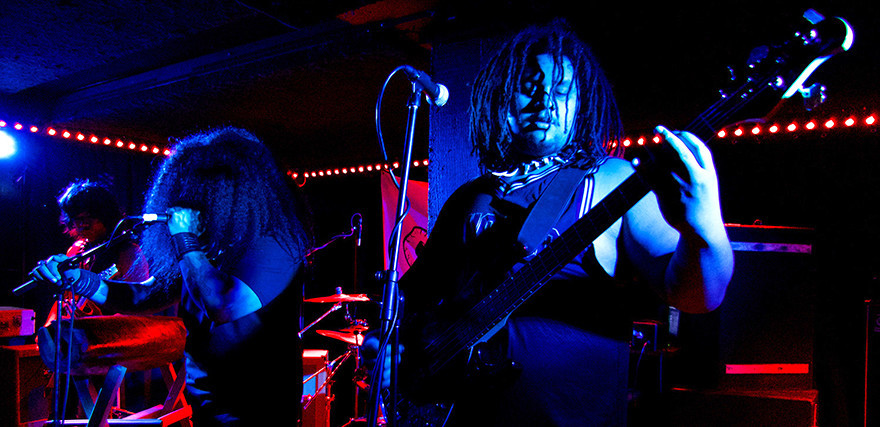
Shepherds Reign at Whammy Bar, Auckland, during the 2022 Others Way Festival. L to R: Gideon Voon, Filiva'a James, Joseph Oti-George - Gareth Shute
In March 2020 lockdowns were announced by the New Zealand Government in response to the Covid-19 pandemic. As with other public facing businesses, music venues throughout the country closed overnight. The financial impact put many of them at risk of closing for good.
The Save Our Venues campaign was a nationwide effort to raise money and help music venues to survive. It showed the importance of venues to musicians and the community of music lovers.
And when things began slowly returning to normal, the Save Our Venues organisation saw it could have an ongoing role in providing a voice for venue owners throughout the country. With a renewed focus on addressing the unique challenges faced by music venues and helping them to thrive, Save Our Venues became Independent Music Venues Aotearoa.
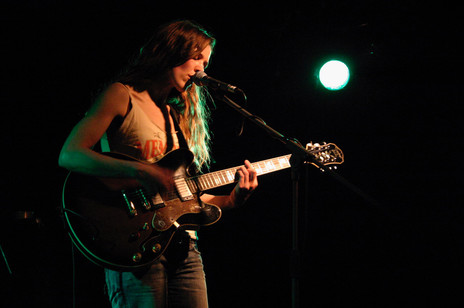
Reb Fountain.
Musician Reb Fountain’s self-titled album was set to be released around the time of the first lockdown in 2020. She worried whether there would be any venues left to play in once the lockdowns finally ended.
“I called up my friend Rohan Evans from the Wine Cellar and sure enough, he was really struggling,” says Fountain. “He had huge rent costs, but with no punters and therefore no income to cover those costs. They were in really dire straits. A lot of people don’t realise that venues are run by people who just love music and love supplying community space. They’re not massive, profit-making businesses. They’re really operating on a very slim margin, so when Covid hit, it just turned their worlds upside down.
“Afterwards I spoke to Lucy Macrae who runs Whammy Bar [adjacent to the Wine Cellar at the time] and she was in the same boat. I was really fearful about those spaces disappearing, because I knew how important they were to me. Those venues fostered me as an artist. I know that it was the same for Tami Neilson, Marlon Williams, Nadia Reid, Delaney Davidson and basically every other musician that I knew. It wasn’t just those two venues, it was venues throughout the country that were at threat.”
Whammy Bar co-owner Lucy Macrae remembers that on the last night before the lockdowns began, she and fellow co-owner Tom Anderson got together with the Wine Cellar’s Rohan Evans so they could meet with their staff. The government wage subsidies had begun and the workers would still be paid, but it was hard to know what else lay in store.
The feeling of uncertainty grew over the weeks that followed, and Macrae was grateful to receive a phone call from Fountain.
“Reb wanted to do an online fundraising campaign for Whammy and Wine Cellar,” says Macrae. “Tom and I had discussed that idea, but we felt like everybody was going through their own version of what we were and it didn’t feel right to put our concerns onto other people. But when we had an artist saying ‘we need you to be there when things get back to normal’ then all of a sudden, we weren’t just looking at it from a selfish point of view, but viewing it through that wider lens.”
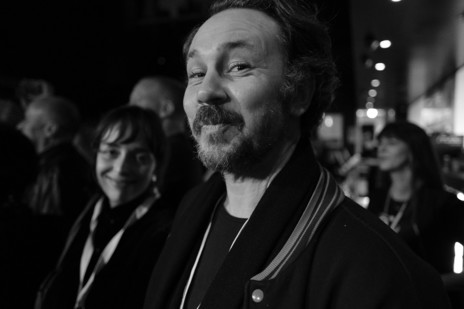
Music promoter Reuben Bonner. - Ben Howe
Fountain reached out to promoters Reuben Bonner and Matthew Crawley, who both agreed to come on board. Bonner has a long history in the music industry, starting as a musician in An Emerald City and then becoming one of the country’s most active tour promoters with his company, Banished Music. Crawley also toured bands (under his own company name Strange News), and was previously the booker for venues such as Eden’s Bar, Schooner Tavern, and Golden Dawn. Bonner and Crawley were old friends and were just preparing to put on their first show working together, but it had to be cancelled due to the first lockdown.
They moved quickly to set up a campaign on the Boosted website and were stunned by the result, with $50,000 raised in the first 24 hours and their stretch goal of $100,000 reached within a week. Macrae was equally taken aback. “It was absolutely insane,” she says. “We were all crying and laughing and not knowing what to do.”
The team met on Zoom to discuss their next steps and soon came to the conclusion that a nationwide effort was really needed. There were already other venues such as Valhalla in Wellington and Darkroom in Christchurch who were running their own campaigns, but it was clear that there were plenty of others who weren’t. It felt counterproductive for each successive venue to have to struggle to gain publicity, when they would essentially be battling each other for attention.

Save Our Venues logo, designed by Stephen McCarthy
They decided that a more effective approach would be to set up a central organisation that would garner the maximum amount of media coverage and provide a single place for punters to find information about their local venues, and contribute accordingly. This was the birth of the Save Our Venues campaign. Each venue involved was given their own campaign, named in a similar manner as “We Love Smash Palace”, “We Love Wunderbar”, etc. A logo was designed free of charge by Christchurch graphic designer and musician Stephen McCarthy.
Getting the operation off the ground took a huge amount of work. Boosted was able to put some money towards each campaign, though it was left to Bonner and his team to communicate with all the parties involved.
“The Boosted team were incredible, and so receptive,” Bonner recalls, “but there was a finite amount of support they could give us and we had to put a number on the amount of venues that we could support in this campaign. It was 30. We finally decided the way it would work would be for one venue to nominate another, just in order to not be overwhelmed. Often we would streamline things by just telling a venue ‘you’re nominated and you need to nominate this next venue’. So I think every day for a month we had to get a new Boosted page made for the 30 venues that were involved.”
Crawley jumped in to provide Bonner with assistance where he could. “Reuben ended up doing the lion’s share of the work on the Boosted initiative and it was an enormous task,” he says. “My role was arranging with friends at Vivid Computers to make a free website for us, and then I maintained it. I felt like a big part of our job was done once the government took notice and they actually gave venues some money too.”
Many of the country’s top musicians fell in behind the campaign
Many of the country’s top musicians fell in behind the campaign, with impassioned social media posts from the likes of The Beths, Marlon Williams, and Tiny Ruins, to name just a few. Musicians in Wellington performed a socially distanced, livestreamed concert at San Fran in Cuba Street to get behind efforts to fundraise for the venue. It survived, though was subsequently sold to Live Nation.
In the end, the Save Our Venues campaign was incredibly successful and raised nearly half a million dollars.
Bonner was hired by the New Zealand Music Commission to be a conduit between them and the venues he had worked closely with since his involvement in Save Our Venues. There he helped them through the application process to unlock more funds that the government had set aside in the wake of the original campaign.
Roy Brown from the Cabana in Napier believes that the lockdowns could have been financially ruinous if it wasn’t for their generous supporters. “Without Save Our Venues help I don’t think the Cabana would have survived Covid without taking out a large loan.”
Ivan Muir from Nivara Lounge in Hamilton was also grateful for this outside assistance, and says that keeping a music venue afloat is still an ongoing struggle. “Nivara Lounge and other live music venues could not have survived the Covid era without the likes of Save Our Venues’ help,” he says. “The thing now is for people to go to the venues and enjoy live entertainment, which will help live music venues survive. Things are still very hard in this industry, and artists need a range of live music venues for them to thrive in.”
By the end of the initial phase of lockdowns, Bonner was feeling burnt out and decided to pass the baton.
“It all took place in the thick of Covid lockdowns,” says Bonner. “A lot of people around me were taking time out to be shell shocked. They didn’t have to think about work, so they focused on being with their families, but for me that void was quickly swallowed up by my work on the Save Our Venues campaign. I do selfishly wish I’d had some family time and was also able to sit back and be gobsmacked by the whole pandemic like everyone else. Though we always talked about that first phase of Save Our Venues as being to stanch the bleeding. We all agreed the next phase would be quite different and it was great that Steve Newall got in touch to bring a new sense of enthusiasm. I was definitely tapped out.”
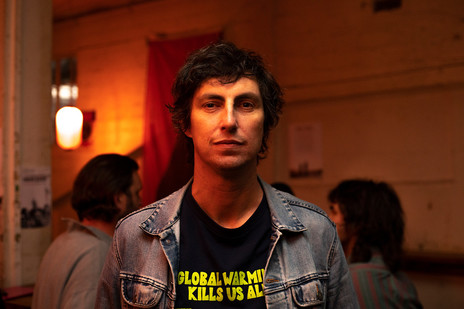
Steve Newall - Warren Paea
Editor of the Flicks film review website in New Zealand, Steve Newall spent many years working in the local music industry. That included time working at 95bFM and at the New Zealand Music Commission, as well as being a contributor to publications like The Fix, Real Groove and Rip It Up. The lockdowns made him reflect.
“I thought – ‘what am I actually contributing to the culture right now?’ says Newall. “For 30 years, I’ve benefited professionally from working in the music industry and also personally as a punter, so seeing these venues potentially swept away was a wake-up call. I already knew that grassroots venues in New Zealand were surviving at the limits of profitability. So I got in touch with Save Our Venues just as the fundraising component was coming to an end, and the country came out of the first lockdown. I saw there was an opportunity to use the platform they’d created to form an organisation that could take a place at the table of industry bodies in the cultural sector.”
Auckland City of Music provided a modest but appreciated amount of seed funding in 2021. This enabled Save Our Venues to take its first steps beyond being a strictly voluntary organisation, with one day of Newall’s time per week paid for over a six month period, and allowing his focus to move more long-term. Newall believes by this stage Save Our Venues had become a useful point of contact for the New Zealand Music Commission and the arts sector side of the government.
Venues still faced a difficult path to recovery. They are generally supported by a core grassroots community which could be easily struck down by an outbreak of Covid-19. An outbreak would result in staff shortages and gig cancellations. They needed to be cautious about how to reopen. Additionally, they are usually enclosed to reduce the chance of noise complaints, and few had outdoor areas conducive to hosting socially-distanced events. So they often had less ability to swing back into action at full capacity, even once things opened up.
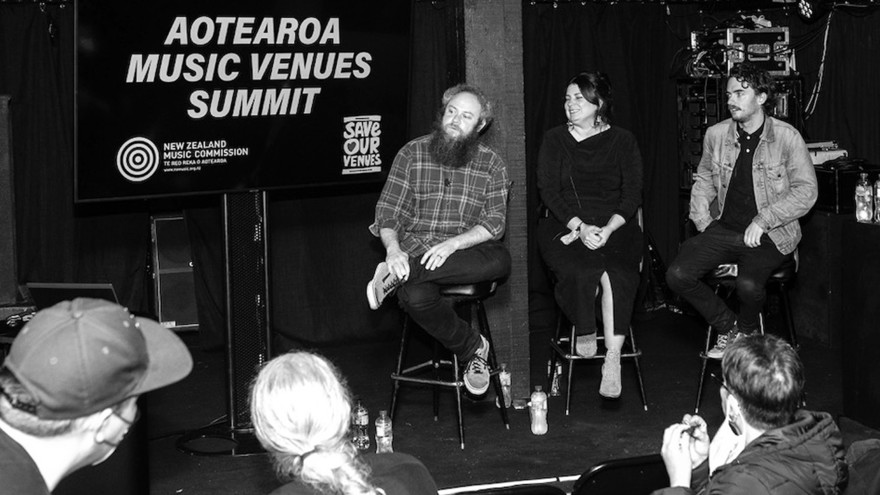
Dave Carter, Catherine Hoad, Taylor MacGregor at the Save Our Venues Summit 2022. - Warren Paea
One of Newall’s key initiatives was to organise a venue summit where the operators could get together and share their experiences, this inaugural summit and its successor in 2022 funded by the NZ Music Commission (who also made a significant contribution in 2022 towards establishing a permanent venues body).
“The first time I programmed it pretty heavily with outside speakers, who could share expertise from other parts of the music sector, whether it was Soundcheck Aotearoa or musicians telling venues about their perspective,” he says. “However, for the next couple we actually had fewer guest speakers, because we could see the value of keeping the doors closed and spending as much time together as possible. That allowed for very open and free discussions about a range of different challenges that venue owners experience. It’s a pretty rare opportunity to get owners from throughout the country together in the same physical place and we have tried to maximise that time as much as possible.”
Feather Shaw, co-owner of Darkroom in Christchurch, found that the first summit provided an opportunity to discuss how a collective of independent venues could continue working together beyond Covid-19.
“At the first Save Our Venues summit in May 2022 there were discussions around the future of the organisation, which was initially set up as a short term project to assist venues through the Covid-19 pandemic. We all agreed that there were still ongoing issues that our venues were facing. Being able to share resources and ideas among our industry peers has been really helpful and inspiring.”
“Venue owners are often community leaders as well” – Lucy Macrae
Lucy Macrae helped to host the first summit at Whammy Bar and found that their impact increased over the next few years.
“The more we spoke to each other and spent these days together, the more empowered we all felt,” she says. “Everybody has the same problems, the same wants, the same love of music and of their community. Venue owners are often community leaders as well. When the cyclone hit the east coast, those venues did food drives and provided accommodation. They got people together to listen to music to take their mind off things. Over the last few years, it’s been incredible just to hear those kinds of stories, especially since we’re usually living in our own bubbles, doing our own thing, surviving. Once you get together, it is pretty empowering. Although we spend a lot of time working on advocacy, I also think that the connection between the venues from all around the country is really important and incredible. These relationships have turned into true friendships and that’s been amazing to be part of.”
Massey University had also been investigating how music venues might be aided in their recovery and contacted Save Our Venues. The project was led by Associate Professor Dr Dave Carter, who has a background as a music producer, engineer, and bass player. When the pandemic restriction first hit, Carter knew that music venues would be particularly badly hit by the lockdowns. He worked with his colleagues to find a way to help.
“At the time borders were still closed, and due to a number of structural factors there was significant risk of both venue closure and/or consolidation of ownership as a result. Working with Save Our Venues and APRA we made a successful bid to the Manatū Taonga Te Tahua Āki Auahatanga Innovation Fund in 2021. In our application we argued that independent venues are key infrastructure for the Aotearoa music industries and that – as history shows – they’re difficult to get back once they’re gone.”
The project received funding from the Ministry of Culture and Heritage. Its aims also responded to work of Carter’s Massey colleagues Dr Catherine Hoad and Professor Oli Wilson, who conducted the Amplify Aotearoa: NZ Music Community Diversity Survey for APRA. Their research identified that “gender emerged as a key factor impacting opportunities, barriers, and experiences of discrimination.” It led to the creation of Soundcheck Aotearoa, the emphasis on expanding the role of music venues in fostering musicians from within the community, especially those who were traditionally underserved.
One requirement was that the funding would lead to a greater inclusion of women, gender diverse, Māori and Pacific performers. To be funded, venues needed to be independently owned and have a capacity of fewer than 800 people. They also needed to promote live music to a paying audience at least three nights a week.
The project highlighted the need for music venues to have their own representative body, tying in well with the work the direction that Save Our Venues was already moving in. They were able to provide a conduit for the Massey researchers to contact venues town by town and city by city.
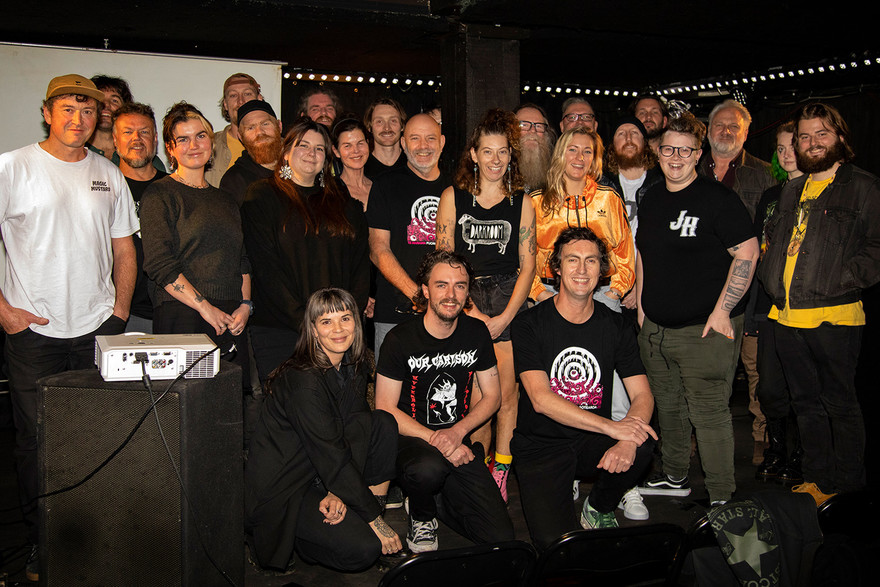
Summit 2023 group, with Lucy Macrae, Taylor MacGregor and Steve Newall in the front row. - Warren Paea
The funding also enabled Taylor MacGregor to be contracted to work with venues in a support and advocacy role. MacGregor had entered the music industry as a bartender at Whammy Bar, but was soon booking his own events under the name Moral Support, running his own music festival (Deep Dive), DJing on bFM as long-running host of the Freak The Sheep show, and eventually became the manager of Whammy Backroom. His career choice was perhaps unsurprising, given that Taylor’s uncle was legendary promoter and venue owner Phil Warren.
MacGregor leapt at the new role. “It was my responsibility to work with the venues in the programme to help them meet the outcomes of the fund – to diversify their programming and build opportunities for new artists. For participating venues, the fund was able to give them the freedom to go out there and bring in more varied artists. They could put on new nights involving people who were usually underrepresented on those stages. Then I was reporting all of that back to show the level of success they were having.”
many regulations to do with noise and licensing can create a fundamental risk to music venues
Another aspect of MacGregor’s work was to become an advocate for music venues more generally. He was able to connect with venue owners throughout the country and met with officials from local and central government to seek ways to address their concerns.
“There are many regulatory functions to do with noise and licensing that can create a fundamental risk to the operation of a music venue,” he says. “There have been a lot of conversations about how the sound of live music can exist in the city without unintended consequences occurring when an apartment or set of houses is built nearby. There are so many examples of that. The Crown in Dunedin had a residential building approved next door and there is another organisation down there, Save Dunedin Live Music, that has been supporting them, because of the potential problems caused by that.
“It’s been part of a wider discussion, because that’s not the only place that has happened. It has affected the venues on St Asaph Street in Christchurch, as well as Valhalla and Meow in Wellington. It has happened in regional areas too. So we’ve been working really closely with councils on planning instruments and district plan changes. But it’s a really long, ongoing process which is fundamentally about [how to] design a city that enables the survival of live music.”
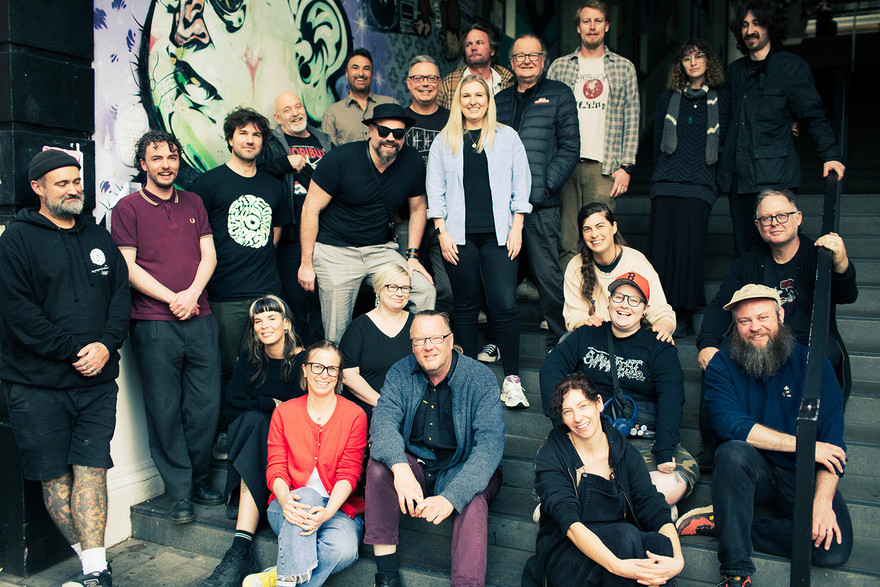
Summit 2024 group. - Paul Taylor
Save Our Venues relaunched as an incorporated society in 2025 under the name Independent Music Venues Aotearoa (IMVA), drawing on the funding earlier provided by the New Zealand Music Commission. Newall oversaw the establishment of this new formal organisation, supported by MacGregor’s ongoing advocacy work. A governing body was set up with a range of representatives from throughout the country: Lucy Macrae (chair / Whammy Bar), Rahine O’Rielly (secretary / Meow), Steve Newall (treasurer / Save Our Venues), Abi Symes (The Stomach), Jonah Merchant (Neck of the Woods) and Richard Barnacle (Space Academy). Darryl Monteith from Smash Palace in Gisborne was a valued member until his passing in 2024.
MacGregor continued with IMVA into 2025, funded 50% by the project run out of Massey University and 50% by Creative New Zealand. Funding for IMVA’s incorporation was also provided by the New Zealand Music Commission, who had previously supported the annual Venues Summits.
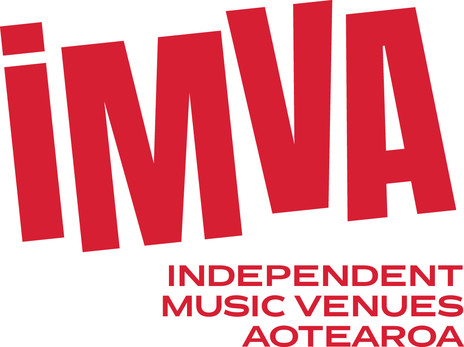
IMVA logo
The need for music venues to have their own representative body is highlighted in Christchurch, where a stretch of St Asaph Street is home to local venues such as Darkroom and Space Academy. The area had largely been occupied by industrial businesses, most of which are closed in the evening. It made the area attractive to music venues, who could make noise without much risk of bothering anybody.
However, in 2022, development started on 18 townhouses immediately next door to Space Academy, causing concern amongst the music community about potential tensions over noise between new residents and the established precinct of venues. There were ongoing discussions between IMVA, the St Asaph Street venues, and the Christchurch City Council about how best to balance central city living alongside a vibrant night time economy.
Feather Shaw from Darkroom is happy to have a wider organisation backing them in these negotiations:
“IMVA continues to be instrumental in representing our venues in discussions with Christchurch City Council as we ultimately work towards some changes in the new District Plan. The regulatory changes we would like to see made aren’t just about safeguarding live music now. The changes are also about thinking ahead towards the future of our city in general as a cultural powerhouse, and approaching district planning in such a way that will best strike a good balance of being a modern, liveable city where people can enjoy living centrally, while also making sure night time cultural and creative spaces can continue to operate and contribute to the vibrancy of the city.”
Prior to taking up the name IMVA, Auckland Council commissioned the organisation to provide a report on threats faced by music venues in the city and to provide a set of recommendations to address them. The results confirmed Steve Newall’s belief that the economics of running a music venue are different to almost any other business.
“Music venues operate much more like theatres than they do bars” – Steve Newall
“Music venues operate much more like theatres than they do bars and don’t generally incentivise alcohol sales,” he says. “Nonetheless, our report to Council showed that around 80% of a music venue’s income comes from bar sales out of necessity, but those bar sales worked out to be fewer than two drinks per person. That is mind boggling, when you consider how small those margins are. The good thing is that we can point to that information to explain that venues aren’t irresponsible places that push booze on the punters. The booze is there, but it is supplementary to the actual purpose of having people participate in the culture and community that these places represent. If you’re a councillor or other government official who doesn’t spend their weekends going to gigs, then you might not realise that. Why would you think there was anything other than a big, glorious booze-fuelled party going on, but that’s not really the case.”
His thinking is echoed by MacGregor, who believes that decision makers need to understand more clearly the important role that music venues play.
“Music venues are community spaces and don’t fit the standard hospitality model. They are part of the cultural infrastructure, effectively they’re the R&D arm of the music industry. In the same way that the sports club down the road provides a pathway for a youngster to become the next All Black or Black Fern. Music venues are an important pathway to a young artist becoming the next Beths or Six60 or Benee …
“What it has done is opened a new conversation about the value of these spaces to our cities and our towns. They bring people into the town centre, they employ people, they provide opportunities for musicians to grow, and they eventually lead to our music being exported overseas. They can be a real economic boon, but there needs to be rules in place to allow them to thrive. Instead of just lamenting that The Kings Arms has closed or whatever your local example is, then we can put things in place so there are a lot of new places opening up and our grassroots music industry can feed from them.”
In some ways the ongoing work of IMVA reflects the thinking that inspired Reb Fountain to start the Save Our Venues campaign in the first place.
“I really wanted to plant a seed that would express that the creative arts are very valuable in their own right,” says Fountain. “Creativity is one of the traits that make us human. The creative arts are not something that you can fund or not fund. In this patriarchal capitalist society, so much of that work is devalued and the environment it needs to survive is devalued. The creative arts are not a commodity, they’re not a business, they’re something that we need to maintain our humanity. The creative arts are about fostering people, as opposed to whatever the economy is – which I think is usually more about business corporations and those that profit from them. The creative arts are essential to a healthy, functioning society. The fact that folks came forward and were so willing to give showed that they recognised that value. The government of the time were willing to see that too. That was a really beautiful thing.”
--